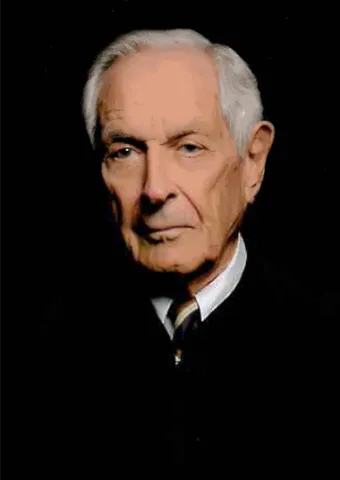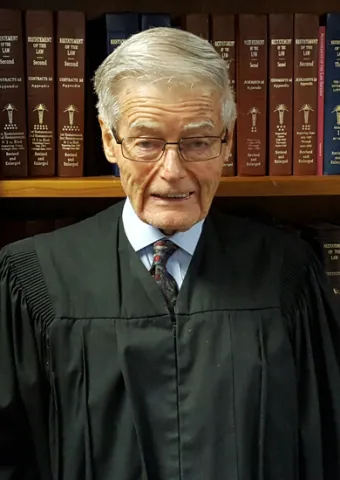As they enter their mid- to late-sixties, many in the U.S. workforce will look forward to retirement and the pursuit of other interests. When Judges Edward McManus and Don O’Brien in the Northern District of Iowa reached the ages of 65 and 69, respectively, they took senior status. But unlike the general workforce, they didn’t retire. Decades later, they’re still on the job.
And Chief Judge Linda Reade is happy they are still willing to help. The court has two authorized judgeships. After Judge Mark Bennett took senior status in June, Reade is now the only active judge.
“Without the continued service of Judge McManus and Judge O'Brien, the heavy case load in the Northern District of Iowa would be more difficult to manage. The judges and staff of the district appreciate their loyalty and dedication to the work of the court,” said Reade.

Judge Edward McManus
At age 95, McManus is one of only two district judges appointed by President John F. Kennedy, who are still sitting. He carries one-fourth the caseload of an active district judge as required to maintain his status as a senior judge.
“I enjoy the work,” said McManus. “I think it’s a public service that I can still perform, as long as I have my health.”
Upon admission to the Bar and graduation from law school, McManus began his public service in World War II as a U.S. Naval Aviator from 1942 to 1946. He instructed naval cadets in multi-engine sea and land planes. Later on in the war, he was a Marauder pilot over the Atlantic training fighter pilots in air-to-air gunnery.
After World War II, McManus served as City Attorney of Keokuk, Iowa. He has since served in every branch of government, first in the legislative branch as a state senator, then as Iowa’s Lieutenant Governor, and now in the judicial branch. After 53 years on the bench, including over 20 years as chief judge—and many more years during which he was the sole active judge in the district—he now takes only a civil caseload.

Judge Don O'Brien
O’Brien, McManus’ junior by three years, was handling a sentencing in a methamphetamine case in late June, one of many drug-related cases he’ll tackle this year. The increase in drug cases is one change in his criminal caseload that he’s noticed since his appointment to the bench in 1978. Some of the highest profile cases then involved fraudulent grain sales. Over fifteen years ago, in O’Brien’s experience, meth cases began to predominate in the drug caseload.
Looking back on his judicial appointment by President Jimmy Carter, he says modestly, “I had been in all kinds of rough fields and had a lot of big trials, so I guess President Carter felt I could do the job.”
Those “rough fields” include O’Brien’s 30 missions over Germany in World War II, serving as a B-17 bombardier, part of the Eighth Air Force. He returned home to Iowa to enter private practice, segued to years of service as a city and county attorney, a U.S. Attorney, then as a Sioux City Municipal Court judge, before his appointment to the federal bench.
Service for both senior judges, even as they enjoy their ninth decade, is not something they find exceptional.
Subscribe to News Updates
Subscribe to be notified when the news section is updated.
